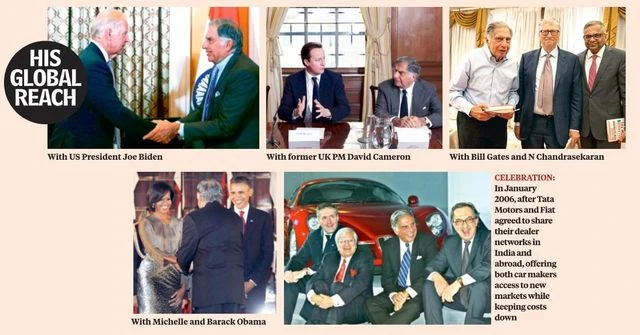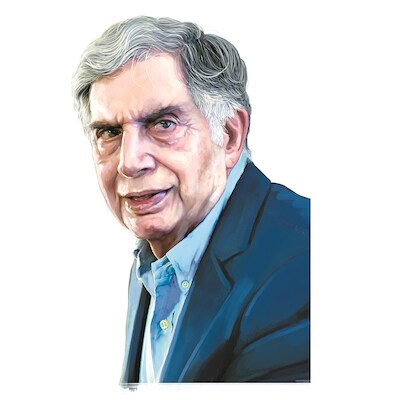Ratan Tata’s transformational journey in Indian industry and global reach
Illustration: Ajay Mohanty
December 28, 1937: Born in Mumbai (then Bombay) to Naval and Sooni Tata. Naval Tata had been adopted by Ratanji Tata, the son of Jamsetji Tata, founder of the Tata Group
1955: Completes schooling from the Cathedral and John Connon School in Mumbai, followed by Bishop Cotton School in Shimla
Click here to connect with us on WhatsApp
1962: Graduates with a degree in architecture from Cornell University, Ithaca, New York
1962: Joins the Tata group as an assistant in Tata Industries; spends six months training at the Jamshedpur plant of Tata Engineering and Locomotive Company, or Telco (now called Tata Motors)
1963: Joins Tata Iron and Steel Company, or Tisco (now called Tata Steel) at its Jamshedpur facility
1971: Is named director-in-charge of the struggling National Radio and Electronics (Nelco)
1974: Joins the board of Tata Sons as a director
1975: Completes the Advanced Management Program at Harvard Business School
1981: Is appointed chairman of Tata Industries. Two years later, drafts the Tata strategic plan; transforms the company into a strategic think tank and promoter of high-technology ventures
1986-1989: Serves as chairman of national carrier Air India
March 25, 1991: Takes over from JRD Tata as chairman of Tata Sons and Tata Trusts; begins a clean-up exercise, driving out the satraps
1991: Tata Motors forays into the passenger vehicle segment with the launch of Tata Sierra
1994 Group exits edible oil and soap business, sells Tata Oil Mills (Tomco) to Hindustan Unilever
1994: Titan enters the jewellery market with the launch of Tanishq
1997: The group sells Lakmé Cosmetics to Hindustan Unilever for Rs 200 crore
1998: Tata Motors launches Tata Indica, India’s first indigenously designed and manufactured car, and Tata Safari, the country’s first SUV
1998: The group exits the pharma business, sells Merind, India’s fourth-biggest pharma company, to Wockhardt for Rs 95 crore
1999: The group exits Tata Information Systems Ltd (renamed Tata IBM), its 50:50 joint venture with IBM. It also sells its 10% stake in IBM Global Services India
2000: Andhra Valley Power Supply Co and Tata Hydro-Electric Power Supply company merges into Tata Power to create India’s biggest power utility in the private sector
2000: Tata Group exits cement business, sells its remaining stake in ACC to the Gujarat Ambuja Cements group
2000: Tata Tea (now Tata Consumer) acquires Britain Tetley for $432 million in a leveraged buyout, becomes world’s second-largest branded tea company
2000: Ratan Tata receives the Padma Bhushan, India’s third-highest civilian honour
2002: Tata Sons acquired majority stake in government-owned Videsh Sanchar Nigam Ltd (now Tata Communications) for Rs 2,599 crore
2004: Tata Motors lists on the New York Stock Exchange
2004 : Indian Hotels Company forays into the value hospitality segment, opens its first Ginger Hotel in Bengaluru
2004: TCS gets listed
2005: Tata exits Idea Cellular, its joint venture with AV Birla Group and the US-based AT&T, to focus on CDMA-based mobile telephony business
2006: The group enters the direct-to-home (DTH) broadcasting space by launching Tata Sky
2007: Tata Steel acquires Corus (now Tata Steel Europe) for $12.2 billion to become world’s fifth-biggest steel maker
2008: Tata Motors acquired Jaguar Land Rover from Ford Motor Co for $2.23 billion
2008: Tata Motors launches Tata Nano, of the world’s most affordable car
2008: Ratan Tata awarded the Padma Vibhushan, the country’s second-highest civilian honour
2008: The 26/11 Mumbai terrorists storm Indian Hotels-run Taj Mahal Palace
2010: Ratan Tata files a petition in the Supreme Court on the Niira Radia tape leak incident, saying it violated his privacy; argues that the tapped conversations were leaked to the media because of corporate rivalry
2012: Tata Global Beverage (now Tata Consumer) signs a JV with Starbucks to launch Starbucks cafés in India
December 2012: Ratan Tata steps down as chairman of Tata Sons after five decades with the Tata group, making way for Cyrus Mistry; is appointed Chairman Emeritus of Tata Sons
2016: Mistry is removed as chairman after a legal battle; in March 2021, Supreme Court rules in favour of Ratan Tata and Tata Sons, says there was no case of oppression and mismanagement against Cyrus Mistry at Tata Sons
October 2016-February 2017: Serves as interim chairman
2017 onwards: Continue investing in startups
)
First Published: Oct 10 2024 | 11:49 PM IST
